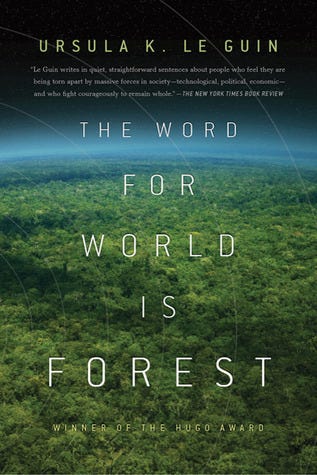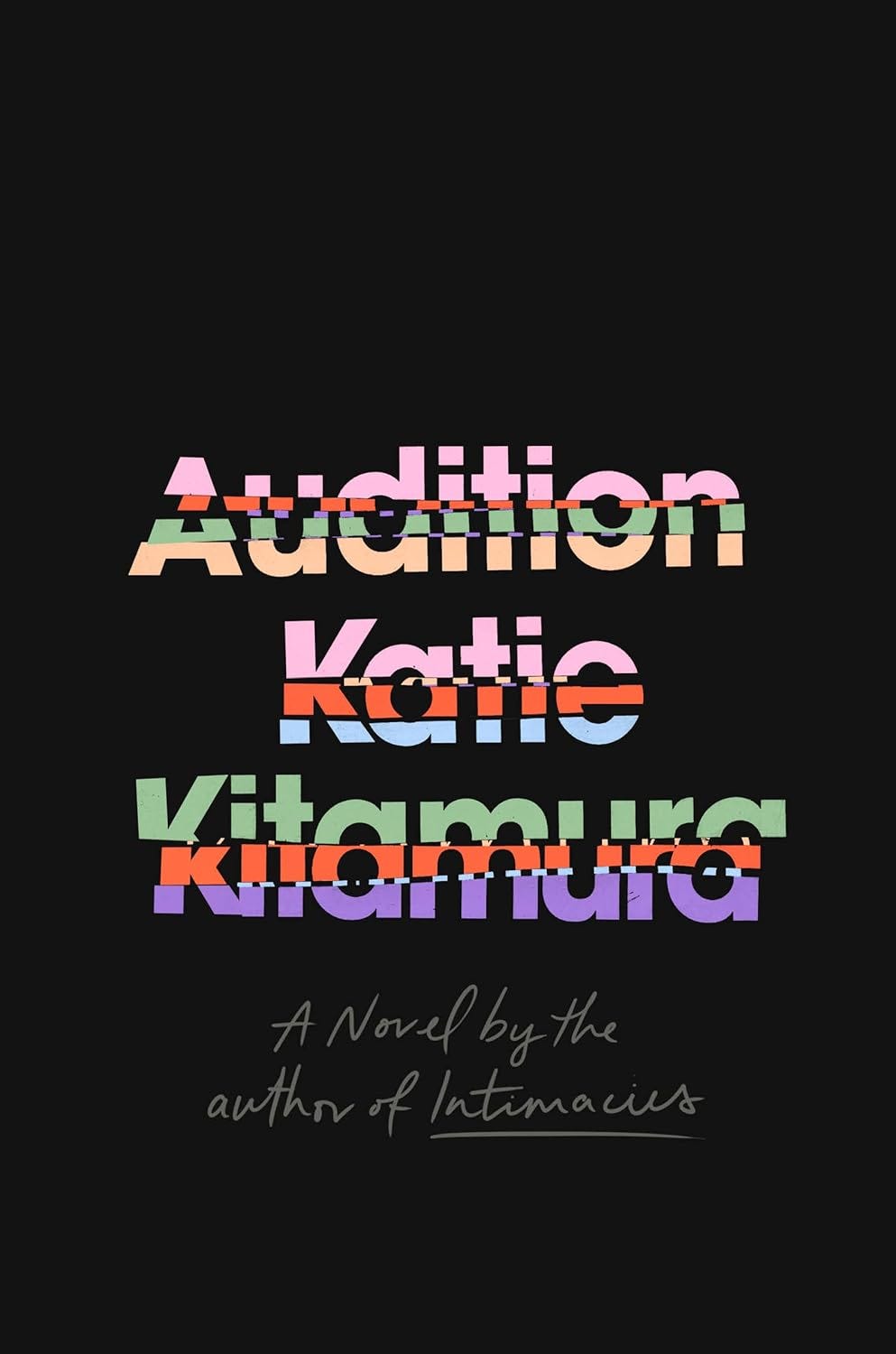May Shelved
This month’s reads have the same energy as overhearing a breakup on the L train and pretending not to listen: tense, uncomfortable, and weirdly addictive.
Between corporate scams, speculative rebellions, sentient blobs, and mysterious maybe-sons, I’ve apparently been in my “unraveling under fluorescent lighting” era and honestly? It’s been great.
The Word for World is Forest by Ursula K. Le Guin
As a longtime sci-fi fan, Ursula K. Le Guin has been high on my list, and I finally took the plunge with The Word for World is Forest: a slim but impactful novella I picked up while visiting a friend in Boulder.
Set on a lush, forested planet, the story explores what happens when exploitative "yumens" invade the world of the Athsheans, a peaceful, dream-oriented species. When one Athshean named Selver leads a rebellion, he sets in motion a shift that threatens to unravel the pacifist roots of his culture.
Short but haunting, this book’s themes of ecological devastation, colonization, and moral ambiguity feel eerily relevant today, when the stakes of protecting both planet and people have never been higher. If you’re new to Le Guin, this is a great place to start: short, sharp, and packed with big questions that stay with you long after the last page.
Audition by Katie Kitamura
Katie Kitamura’s Audition is the kind of book that forces you to flip back a few pages just to confirm what you think just happened actually did. It opens with an actress meeting a young, enigmatic man at a FiDi restaurant. Are they strangers? Lovers? When he claims to be her son, and she insists she has no children, the line between roles, relationships, and realities begins to blur.
Then Part II begins, and suddenly we’re elsewhere: the same actress and her husband welcoming the same young man into their home as their son. What unfolds is less about the transition itself and more about the slippery nature of identity, performance, and perception.
I had the chance to hear Kitamura speak about Audition this month in conversation with Meghan O’Rourke (The Invisible Kingdom). She discussed her influences (particularly horror films) and how she builds tension through atmosphere and character rather than plot. Audition is quiet but razor-edged, the kind of book that leaves you unsettled in the best way. Naturally, I left with another of Kitamura’s novels, A Separation, in hand because nothing says “self-care” like performative grief in the Mediterranean.
Glengarry Glen Ross by David Mamet
Since I’m seeing Glengarry Glen Ross on stage later this month (with Kieran Culkin and a cast full of heavy-hitters), I figured I’d get ahead and read the play first.
Imagine Succession, but everyone's broke, sweating, and yelling about real estate leads.
The dialogue is fast, overlapping, and sharp, designed to keep both characters and readers on their toes. The plot centers on a group of desperate salesmen willing to do just about anything (ethically or otherwise) to stay afloat in a cutthroat business. It’s grimy, tense, and possesses the kind of dark humor that makes you cringe… like you're in on a terrible joke you wish you weren't.
I’m curious to see how it plays out live, especially with Culkin’s gift for playing high-strung men on the edge. If the performance is half as stressed out as the script, it’s going to be electric.
On the Calculation of Volume I by Solvej Balle, translated by Barbara J. Haveland
Shortlisted for the 2025 Booker Prize, On the Calculation of Volume I follows Tara Selter, a rare books dealer on a business trip in Paris who wakes up to find the day has reset. Again and again.
When she gets back home, her husband casually tells her it’s November 18th… for the first time. Except she’s already lived it. More than once. The book isn’t about fixing the loop so much as it is about surviving it. Tara unravels quietly, like a sweater with one pulled thread, trying to make sense of a life with no forward momentum. It’s intimate, slow, and somehow still gripping.
This is for the patient readers, the overthinkers, the “I take the long way home because I like the silence” types. It asks big questions about time, identity, and connection, and answers them in little ways. Like a stranger holding the subway door just long enough or hearing your upstairs neighbor play the same sad song on repeat at 2 a.m. Poetic. Weird. Kinda brilliant.
Blob: A Love Story by Maggie Su
Okay, I know what you’re thinking… actually, I don’t, because I didn’t know what to think when I started this book. Blob follows a 24-year-old hotel desk clerk and college dropout, reeling from a breakup and floating through life in that numb, liminal space you only really know in your twenties.
Then she finds a sentient blob outside a dive bar and takes it home.
What starts off surreal and a little gross quickly becomes strangely tender. She begins shaping the blob into her ideal partner: projecting, molding, and filling the emotional gaps left by heartbreak and general floundering. It’s weird, yes, but also sharp, funny, and painfully relatable in that “I’m spiraling but it’s fine” kind of way.
Blob is part existential heartbreak, part girl-meets-goo. If you liked Severance by Ling Ma or My Year of Rest and Relaxation by Ottessa Moshfegh, this one’s for you. It’s for anyone who’s ever tried to heal by rearranging the world instead of facing what’s inside. You’ll laugh, cringe, maybe cry a little, and then probably text your ex something ill-advised.
And that concludes the books I shelved in May. Thank you for reading and keep an eye out for the June newsletter for our next book club announcement, book events to attend next month, and more!









